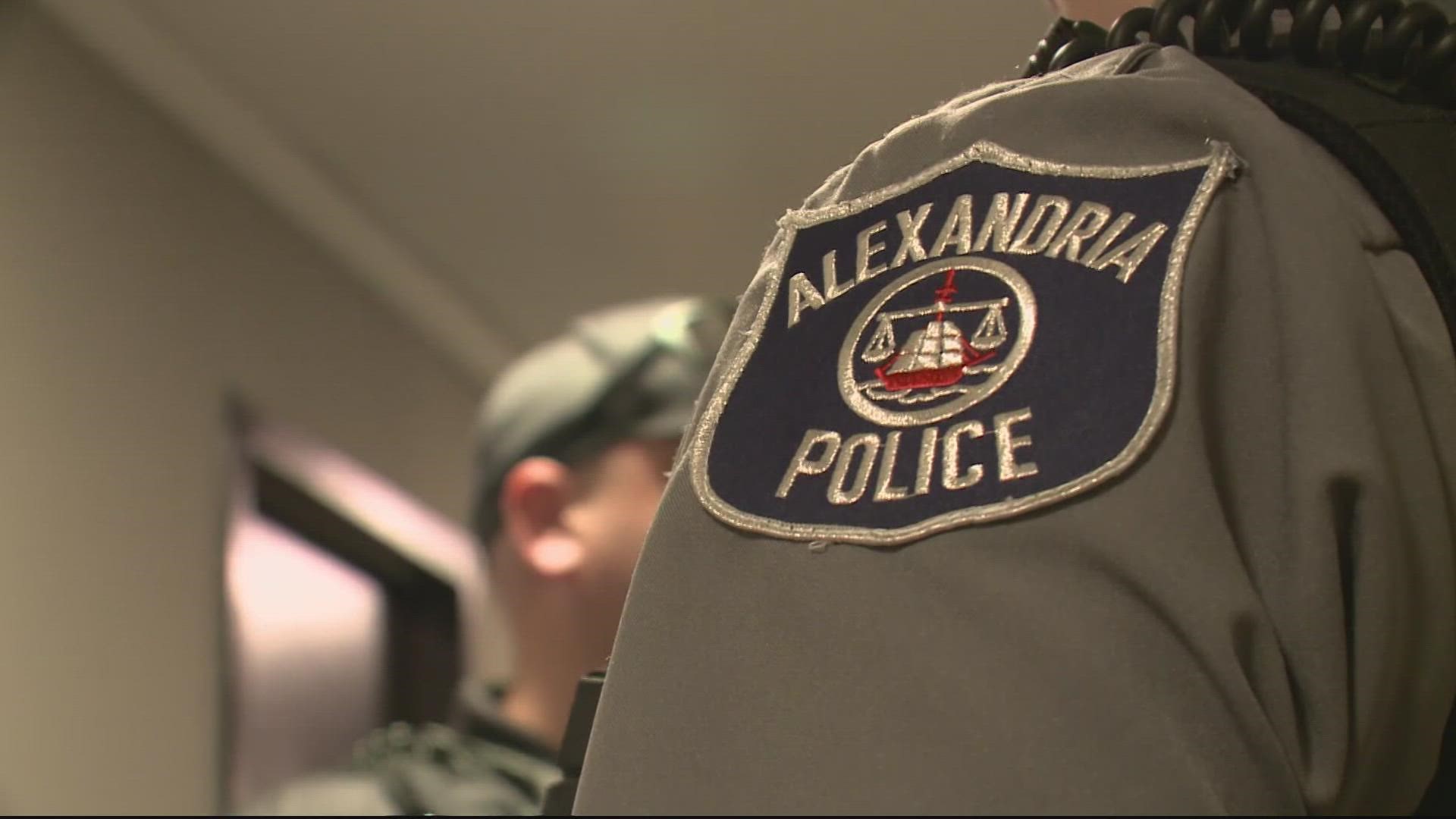ALEXANDRIA, Va. — The mission to provide more resources instead of jail time for people experiencing mental health issues in Alexandria is getting a boost of support.
The Alexandria City Council recently approved a budget to fund two additional teams to the Alexandria Co-Response Program (ACORP). The program, which first launched as a pilot plan in October, pairs a police officer and a mental health expert to behavioral health calls.
The team is made up of Officer Tommy Evans and Dr. Megan Hencinski. The duo initially started working eight-hour shifts from Monday through Friday before transitioning to a Monday through Thursday workday from noon until 10 p.m. to better address the high number of consistent calls at the start of the week.
The new roles have been an adjustment for both departments.
"I'm used to jumping into situations and trying to de-escalate so it has been a big learning curve to step back and listen to his direction as to what they're assessing before I come into the scene," Hencinski said.
Officer Evans called Hencinski a "huge resource."
"It takes a lot of liability off of the officers who have limited mental health training," Evans said.
WUSA9 was invited to follow the team as they responded to a possible suicidal call at an apartment complex in Alexandria. The situation stemmed from a woman who was distressed over her relationship with her boyfriend. He reportedly called police concerned that she was suicidal.
The team entered the unit and quickly notified the woman that Hencinski was not a police officer. After he scanned the room for weapons, Evans made the rare move to step outside to give both women the time to bond and talk.
"Were you trying to hurt yourself?" Hencinski asked the woman. "Even if you're not trying to hurt yourself it does seem like something else is distressing you and if there's anything we can do to help you, we'd like to do that."
Hencinski determined the appropriate action is to connect the woman to some resources to guide her through some relationship woes and follow up the following day. While criminal offenses were not identified, Evans is filing the call under a domestic case to alert the detectives.
"I try to figure out what triggered today's events, what's going on in her life that's distressing her and what is her risk of suicide," Hencinski told WUSA9. "How can we best serve the individual, making sure they're safe and not in crisis in an environment that's the least restrictive."
The collaborative effort between the Alexandria Police Department and the Department of Community and Human Services released early findings from a five-month period. There were 958 behavioral health calls between October and February. The ACORP team responded to 145 (16%) of them with more than half related to unusual behavior or threats and harm to self.
Nearly half of the calls were resolved on scene by providing a resource or referral to a community service or a voluntary transport to a hospital or shelter, according to the report. Of the 14 calls that could have resulted in an arrest, 10 encounters (71%) of them were kept away from jail time.
"This allows us to bring experts to the crisis to help de-escalate and try to determine what's the best solution and it doesn't have to involve taking them anywhere, and a lot of times that means handcuffs," Captain Courtney Ballantine of Alexandria Police said.
Many of the officers already have Crisis Intervention Team (CIT) training. More than 80% had an officer respond with CIT training.
Officials hope to address more calls throughout the week with the help of the two new teams by the summer.
"They show up in a softer uniform and in an unmarked vehicle so it doesn't feel like a criminal justice intervention but it feels like a therapeutic intervention," Director of Clinical and Emergency Services Liz Wixson said.
The city also provided several accounts of success stories including one example where ACORP handled a call of a suicidal man:
"ACORP was dispatched to a scene involving a person engaging in suicidal behavior, with a knife in his hand, who had been cutting himself. Several units jointly responded to the call since there was a weapon involved, so there was a heavy police presence on the scene. As the ACORP team was trying to engage with the individual, they were surrounded by police officers (due to the imminent danger). The individual shared that he did not trust the police due to previous negative encounters and threatened to harm anyone coming close to him physically. He did say that he would talk to the ACORP co-responder (Megan) alone, but given that he was still a threat, the co-responding officer stayed in the room, and the other law enforcement officers were asked to slowly, one-by-one, step outside briefly. At that time, the ACORP team was successfully able to de-escalate this individual, get him to hand over the weapon, and voluntarily go with them to the hospital for further assessment and treatment. The individual got the help that he needed. This situation also increased trust between law enforcement and the co-response team and between the individual and law enforcement."
While there are many early signs of success, there is still more room for improvement. One challenge is to have more training and collaboration so 911 dispatchers can appropriately categorize behavioral health calls and notify ACORP.
There are also limited opportunities for cross-training and guidance around best practices and the need to bridge the gap between behavioral health and law enforcement cultures.

